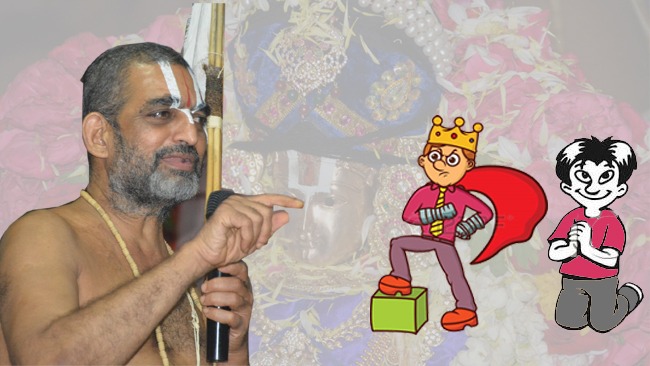Whom do you like the most? Parents, children, friends, cousins, or yourself? It is ‘yourself’ (aham). That is why we find it very hard to take any criticism, we find it hard to accept certain truths and limitations about us. When a close one passes away, we are sad because we miss the association with him/her. The suffering of a loved one is hard on us, that is why we try to alleviate our pain by helping him/her.
It is also for the same reason that some people are attracted to teachings that are focused only on self-improvement and not on God-realisation. So, we like ourselves the most. Is it wrong? No! But, it’s just very important to know what we truly are, so that we are not settling down with anything less.
We (the aham, soul) are by nature completely knowledgeable (gnana) and we are completely eligible for permanent ultimate joy (aanandam). But, that is possible only when we recognise that we are in the shade of God. Currently, we are subservient (dasoham) to senses instead of to that God. The manas driven by the desires of these senses overtook the smart soul. It is ruling our direction. The result is that we are in a body that is bounded in many factors.
You may ask, “If I (the soul) am super smart, shouldn’t I know that the pleasures given by the senses are temporary and I may not attain a blissful permanent state just by continuing to only satisfy them?”
Sure, we do. But we made a choice in the past to try these pleasures. We cannot reverse that decision. We are experiencing the results of our decision and in the process, we have come far away from our true state. However, we can still go back to that state! How?
Let the aham (the self) say dasoham to God. Put your head down and seek God’s refuge! Remember we started off saying we like ourselves the most and so its not easy to put ourselves in anyone’s lead, not even in God’s lead!
Think about it, shouldn’t we like God because He is always ready to take care of us despite us becoming ignorant of the truths and arrogant about ourselves!? Shouldn’t we fall in love with God for selflessly awaiting in our hearts even after continuous rejection? [You may ask – How do you know God is doing all this for us!? – It’s a whole another topic but let’s see briefly, Did you choose your parents and time of birth? Are you dictating terms to Sun and Moon? There are so many things that we haven’t experienced, but rushis have given us all the knowledge on the secrets of existence.. and it is from that source of knowledge that we know who God is and what He does!]
So – With love and gratitude, Let Him lead us. Let His wish become ours. Let His task become ours. Let Him become ours!
He is like air, you will not deplete air for others by taking breath heavily…! So, feel free to feel Him to the utmost core level and enjoy the sweet and powerful company!
Nammalwar did exactly this. He did not let his manas shut down the door to true knowledge about himself! Therefore, He saw the true form of God filled with divine qualities, in the entire existence and within himself.
One such supreme quality of God that Nammalwar experiences is aarjavam. The general description of this quality talks about how one’s manas (thoughts from his heart), va:k (word), and kaya (action) are always in sync. This quality is in its best state within God. He made a promise to protect us. But, we have been rejecting or ignoring His presence. Even then, He makes our path as His path so that He is ever-ready for all support as soon as we call out to Him. This is how aarjavam flourishes within Him!
One may think – I don’t understand any of this. I am not in any miserable state. I react righteously to situations. I don’t see God is within me trying to protect me. I am making choices and observing the consequences of those choices. I will act according to my will because my will is pure and harmless.
You may not see God. But, you also don’t see hunger. It exists because you feel it. A sick person may not even feel hunger until he gets better again. Can we say that hunger does not exist, or do we just say that it was not felt at that moment by that person? Think about it…!
– From the discourse of Sri Chinna Jeeyar Swamiji, Bhagavad Vishayam


